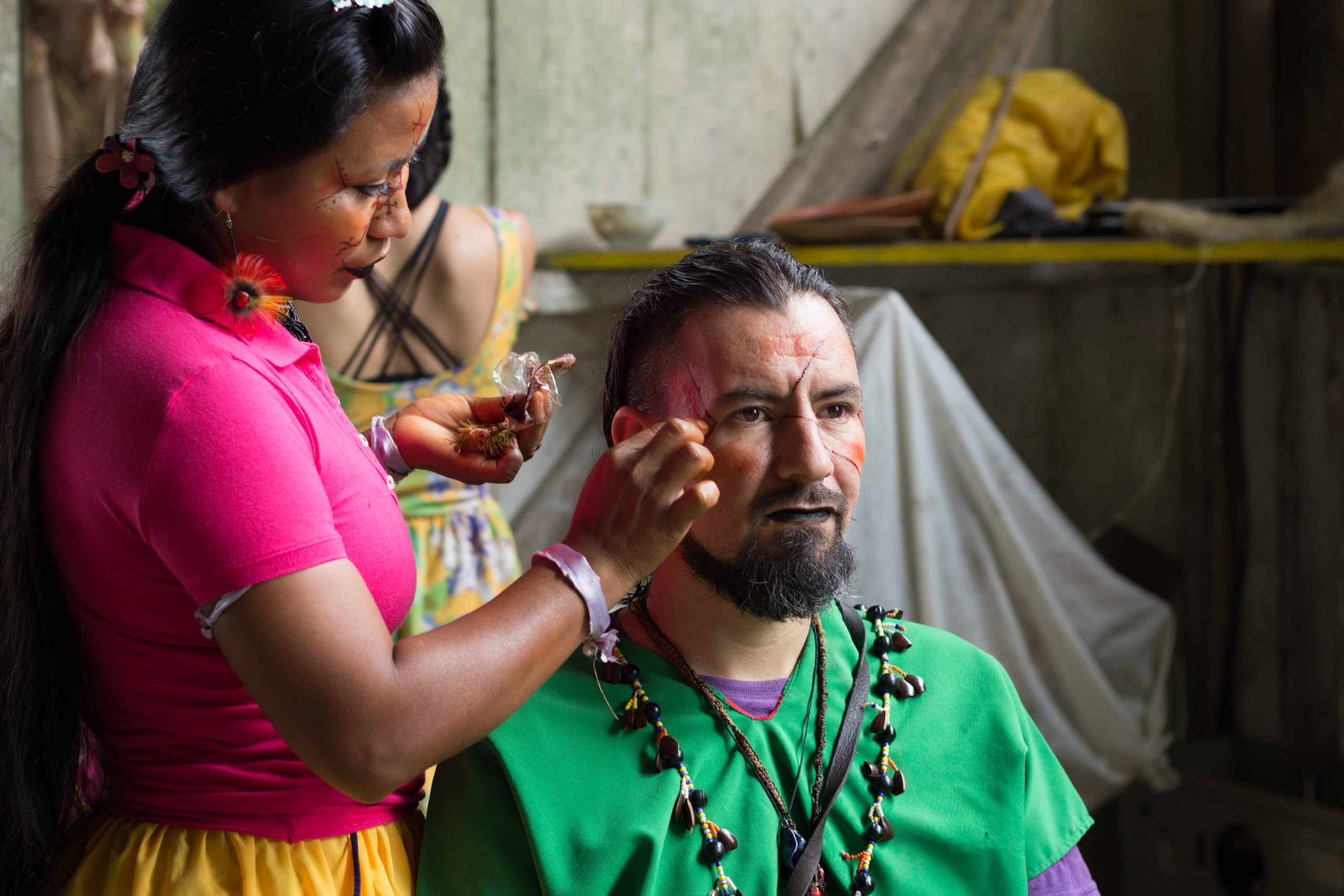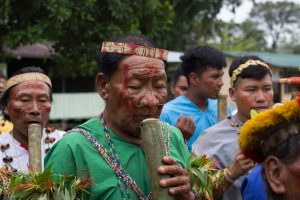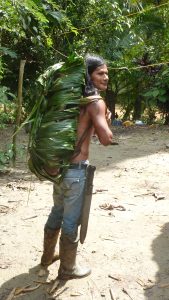It’s in our nature to fight
[vc_row][vc_column][vc_single_image image=”117715″ img_size=”full” add_caption=”yes” alignment=”center”][vc_column_text]Ecuador is not a safe country for environmental defenders. They are criminalised, threatened, attacked and even assassinated for attempting to uphold the rights of nature decreed in the constitution.
While the overt incitement to hatred against environmental activists ended when Lenin Moreno replaced Rafael Correa as president in 2017, and some imprisoned indigenous leaders were freed, the intimidation and threats continue.
In 2018, there were several attacks against members of the Collective of Amazonian Women who work to defend the Amazon region from oil and mining. Margoth Escobar had her house set on fire and Patricia Gualinga, from Sarayaku, had rocks thrown through her bedroom windows at night. Others received death threats.
The same year, three water defenders – including Yaku Pérez Guartambel, then president of indigenous peoples’ organisation Ecuarunari – were kidnapped by mine workers, believed to have been following orders from above. An angry mob kicked, dragged and tortured Pérez Guartambel, accusing him of leading anti-mining efforts. They planned on crucifying him and started gathering materials until a group of journalists broke through with cameras and rescued him.
Since a 2019 uprising of indigenous peoples in the country, the government has more forcefully set its sights on the indigenous movement as the internal enemy to be defeated.
Indigenous leaders are repeatedly persecuted and intimidated. The repressive apparatus has been strengthened, with millions of dollars allocated for the provision of equipment for the police and military. The creation of a new legal framework in May 2020 would have enabled the deployment of the military to control internal order. This would have provided protection to strategic sectors such as mining, against which indigenous communities have been struggling for years.
In May 2021, right-wing banker Guillermo Lasso assumed the presidency in Ecuador, ending more than a decade of left-wing rule. Index on Censorship spoke to Franco-Brazilian academic and indigenous rights activist Manuela Picq about what the change means for censorship. After marrying Yaku Pérez Guartambel in an indigenous ceremony, Picq was herself censored by the government of Rafael Correa, which forced her into a three-year exile.
“There are many ways of censoring. We have seen traditional censorship mostly from the left in Ecuador, by Correa in particular, who implemented very repressive media legislation and enforced it with violent oppression. Then there are other forms of censorship, which are not traditionally recognised as such, the neo-liberal way of buying support. Under Lasso, journalists and media outlets are not fulfilling their critical role because they receive so much state advertising revenue. I see this as a form of censorship, when the public is left uninformed about the government’s activities, which happen largely in the dark. In this context, whistle blowers will play a critical role,” said Picq.
“This is a weak government that has been forced to ally with Pachakutik, the political party of Ecuador’s indigenous movement, which is currently presiding over congress. This means Lasso will carry out his agenda in the most discreet way possible, to avoid being overthrown. So, mining in indigenous territories, or the privatisation of the public sector will be labelled as “development”. We are relieved in Ecuador that we no longer have Correa-ism, with its traditional, explicit forms of censorship, but we should not underestimate the other forms of censorship that are more subtle and insidious.”
The multicoloured people
Jimmy Piaguaje is a young indigenous Siekopai defender from Siekoya Remolino, a community of 53 families living on the banks of the Aguarico River in the north-eastern Ecuadorian Amazon region.
The Siekopai (which means multicoloured people) are renowned for their shamanic acumen and knowledge of medicinal plants, with uses for more than 1,000 different plants.

The Siekopai are known as the multicoloured people, photo: Erin Deo
In the 1600s, when Jesuit missionaries arrived in Siekopai territory, there were 30,000 to 40,000 Siekopai in the zone between Putumayo, the Aguarico River and Napo.
Traditionally, the Siekopai lived communally in gigantic malokas (open sided wooden huts) with 40 to 60 families. This coexistence meant that people did everything together. Everyone got up at about 3am to prepare and drink yoko, twist threads of chambira (a palm from which the fibre is removed to make hammocks) and tell stories. The women would discuss what they would do that day, what the future would bring. The children would be there, too, learning from their parents and elders.
The missionaries brought illnesses such as measles, wiping out 90% of the population. Whole peoples and clans disappeared. The few who survived did so by hiding in the depths of the jungle. Then the rubber-tappers arrived and removed the Siekopai from there, too.
Currently only around 1,600 Siekopai remain – 900 in Peru and 700 in Ecuador, where they live in a 50,000-acre fragment of rainforest.
“We feel very threatened, very worried, because our territory is very small and we are surrounded by oil exploitation and monoculture agriculture,” said Piaguaje.
“I know from talking with my father, with our elders, how our territory used to be. Now we have almost no resources, almost no fish, no animals to hunt. Our rivers are contaminated by toxic waste from the oil palm industry. Lack of food sovereignty is a really big worry. These are the threats that we are facing.
“All of these things have made us think about where we are going. Will our culture survive another five, 10, 20 years? Or will we just die?”
The pandemic, too, has had a deep impact on the Siekopai.
“In the Ecuadorian Amazon, the Siekopai nationality was the first to confirm positive cases of Covid-19,” said Piaguaje. “A wise elder who died of Covid – a family member of mine – knew a lot about medicinal plants. That was major blow for the Siekopai because there aren’t many of us and we all know each other. Then a teacher died; he had long been involved in the struggle to defend our culture. It was a very difficult situation.”
The Siekopai sought help from the local and national governments but there was little or no response, although some organisations provided medicine, tests and accurate information.
“We started to realise that the medicine from outside wasn’t helping us,” said Piaguaje. “Faced with many cases of Covid, we started to look to medicinal plants. In the end, the majority of people who survived were treated with medicinal plants. And we’re still treating people with plant infusions, such as ajo del monte, chinchona and cedros, with good results.
“This has led to some very important reflections within the Siekopai communities; a rediscovery, appreciation and faith in our own ancestral medicines. And when everything collapsed in the outside world, although we were affected, we were more or less OK. This has been a deep reflection for us, seeing how the rest of the world is suffering and realising what is important.”

Just 1,600 Siekopai survive in a 50,000-acre fragment of rainforest, photo: Erin Deo
In response to the existential threats they face, Piaguaje and a group of other young Siekopai leaders have formed an organisation, Sëra, named after the spirit of heaven that arrives every summer to announce a new era. They have developed a number of innovative projects, safeguarding ancestral shamanic knowledge in video format and running environmental workshops with Siekopai youth.
“Ancestral knowledge is being rapidly lost,” he said. “Young people are no longer interested, due to the influence of the Western world. Our wise elders are dying without leaving a legacy.
“Together with another young Siekopai defender, I created a project to safeguard their knowledge with videos. We go out with them when they are harvesting plants and record them talking about how they identify and use them. This project brought our group of young leaders together.”
The group is now running school workshops to promote environmental awareness through intergenerational exchange between elders, parents and children.
“We talk about ancestral knowledge, the identification and uses of medicinal plants, the threats that we face. We ask, what is important to us, what do we want to preserve, as Siekopai? The aim is to instil in the children the consciousness that our territory matters, that they should have respect for the elders, for Mother Nature, for our own cosmovision [the worldviews shared by indigenous peoples].
“We know that the children are like seeds; if we plant in them the idea that they must cut down the jungle to plant oil palm, they will want to do that,” he said.
“But instead we are saying to them, ‘We must take care of the jungle, this is our wealth, there are other ways to do things, to survive’. That’s why I think education is so important.”
Piaguaje believes it can help combat climate change.
“The indigenous worldview is based on living in harmony with nature and other people, respecting everything around us,” he said.
“It is a model that does not require us to plunder all natural resources. We are taught that we are all part of Mother Nature, that it is our responsibility to use resources in a sustainable way.
“Mother Nature provides everything: medicine, food, water and air. We don’t need to destroy but to co-exist.
“This way of life is based on reciprocity. Even if the other person is different from me, we share. Sharing and co-operation. That is how our ancestors lived and that should be the model of how we live, too.
“I think a global shift towards these values could help to combat climate change.”
The People of Noon
José Gualinga is a leader of the Native People of Sarayaku, an indigenous Kichwa group with 1,400 inhabitants living in a remote part of Ecuador’s southern Amazon.
Known for their defence of the rights of nature and indigenous peoples, the Sarayaku call themselves the People of Noon, referring to an ancient prophecy of their ancestors claiming that they would be a pillar of resistance after other communities had surrendered – a beacon of light as strong as the midday sun.
In 2012, the Sarayaku won a historic victory at the Inter-American Court of Human Rights, which found that the Ecuadorian state had violated their rights by allowing an oil company to prospect in their territory without consultation.

Photo: Beth Pitts
A turning point in the case came when José’s father, Don Sabino Gualinga, the spiritual leader of Sarayaku and their most eminent yachak (shaman), then aged 92, took the witness stand. He was asked about the impact of the 1,433kg of explosives that had been planted in Sarayaku territory by the oil company, accompanied by armed military personnel. Referring to the invisible beings that had been disturbed by the explosions, Don Sabino said that “half of the masters of the jungle are no longer there”.
He added: “It is a living forest. There are trees and medicinal plants and all kinds of beings … Many hid, others died when it burst. They are the ones who maintain the jungle, the forest … All of those who wish to cause damage, they don’t understand what they are doing. We do understand it, because we see it.”
The same year, the Sarayaku created the Kawsak Sacha (Living Forest) Declaration asserting that, as a living entity, their territory is subject to legal rights and demanding that these rights be upheld. The proposal was presented at global climate change conference COP21 in Paris and to French president François Hollande in 2015, and to the Ecuadorian government in 2018 before winning the prestigious UN Equator Prize in 2021.
The Sarayaku have also launched a professional football team to spread the word about oil exploitation in the Amazon; sailed a canoe down the Seine; and created a documentary, Children of the Jaguar, which won best documentary at the National Geographic Film Festival in 2012. Their 2021 documentary, The Return, which tells the story of one family’s retreat into the Amazon to escape Covid, was made for The Guardian and featured at the 2021 Sheffield DocFest.
In 2021, the Sarayaku are once again under threat, with the government’s plan to auction three million hectares of largely virgin rainforest to oil companies, including nearly all the Sarayaku territory. To represent their peaceful resistance to extractivism and commitment to defend the Kawsak Sacha, the Sarayaku are planting a 100km-long perimeter of flowering trees around their territory known as the Sisa Ñampi; it symbolises the fragility of life and the ephemeral limit of existence between life and death.
Gualinga believes that the philosophical thought of the Sarayaku can help combat climate change.
“Climate change will be resolved only if we actively seek solutions,” he said. “Global citizens must undertake a long road to resistance and peaceful struggle, towards a different perspective that we call tiam. By itself this philosophical thought is only a form of knowledge, but it can be made reality if each and every one of us participates in the minga [collective community work].
“Tiam is a counterpoint to the dominant worldview, which sees nature as ‘other’, as an object for exploitation. This has led to imbalance and severe climatic changes, as well as the current pandemic. At the heart of our philosophy lies the understanding that we live as an embryo in the womb of the Pachamama [Mother Earth]. Only in this way will nature be respected, will we live harmoniously, benefiting from the resources that the Pachamama bestows on us.
“We believe that if the human being accepts this way of life, the pain of the planetary wound will be felt, healed, and life will be born again.”
He added: “Indigenous peoples are already contributing towards global climate change solutions by taking care of their territories, which are mega-diversities of living beings. The Sarayaku conceived the Kawsak Sacha life project as a powerful nucleus, so that through these invisible beings, who are conscious and therefore have legal rights, we can regulate the balance of the earth and together we can fight climate change.”
Many communities of indigenous peoples have been divided by oil companies but the Sarayaku have maintained unity, said Gualinga.
“The unity of the Sarayaku arises from the legacy of our ancestors, from the great stories and prophecies that have led us to consider ourselves as the People of Noon, descendants of the jaguar, children of Amazanga Runa,” he said.
“Other nationalities – let us call them ‘communities’ or ‘peoples’ – their unity is maintained in a superficial way, through an organisation. While the statute of the organisation may be recognised by the competent authorities, the people lack the background of using their history and wisdom as a strength.
“When the unity of a society – or let’s call it a ‘cultural civilisation’ – of the Amazon forest is founded on historical and cultural principle, the oil companies cannot break it.”
The people of Sarayaku are masters in the selective use of modern technology, such as digital resource mapping, and using social networks without losing their cultural identity.
“If well used, technology can serve to strengthen new processes of collective and organised adaptation,” said Gualinga. “Based on this logic and analysis, the people of Sarayaku have adopted certain tools, such as the internet, which we use to disseminate the processes resistance in defence of our lives; to make known the proposals that come from within the territory and from the deep jungle. The jungle society has always been in a state of interaction, actively looking for solutions for threats such as climate change.
“Historically, it was impossible to make visible Sarayaku’s proposals in a dominant, complex world, full of wars and devastating economic conflicts. Now, with these new technologies, we can successfully disseminate communications on history, culture, proposals, visionary projects to conserve and protect the balance of the land and ensure the continuity of the Living Forest.
“These technologies have also allowed us to safeguard the memories of art, culture and stories, so that future generations can continue learning.”
Help the Siekopai Indigenous Amazonian Youth Foundation through its crowdfunding campaign at gofundme.com/f/siekopai-indigenous-amazonian-youth-foundation.
This article is based on interviews for Writers Rebel[/vc_column_text][/vc_column][/vc_row]

 The Winter 2019 issue of Index on Censorship magazine looks at the current pack of macho leaders and how their egos are destroying our freedoms. In this issue Rappler news editor Miriam Grace Go
The Winter 2019 issue of Index on Censorship magazine looks at the current pack of macho leaders and how their egos are destroying our freedoms. In this issue Rappler news editor Miriam Grace Go